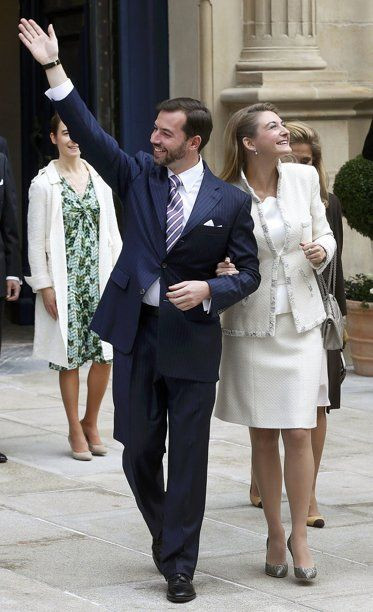Pass The Duchy: Luxembourg Prepares For Its Own Royal Wedding

The Grand Duchy of Luxembourg is preparing for its own royal wedding, although these nuptials are unlikely to attract the magnitude of global attention seized by last year’s holy union between Britain’s Prince William and his bride Katherine.
Luxembourg, a landlocked nation of just a little more than 500,000 people occupying a space about two-thirds the size of the smallest U.S. state, Rhode Island, is eagerly anticipating this weekend’s wedding between Crown Prince Guillaume, 30, the next in line to the throne, and his Belgian bride-to-be, Countess Stephanie de Lannoy, 28.
Luxembourg, one of the most obscure states on the planet, nonetheless occupies a very elegant neighborhood. The duchy is bordered by Belgium and France to the west and Germany to the east.
A democracy with a constitutional monarchy, Luxembourg is also one of the wealthiest nations in the world -- indeed, according to the International Monetary Fund, it boasts the second highest per capita GDP on a purchasing-power parity basis of $80,119 in 2011 (the Arab emirate of Qatar was first).
Luxembourg’s economy, once dominated by steel, is now led by banking and finance. The tiny state is even the tenth-largest holder of U.S. Treasury securities.
Jean-Claude Juncker, a two-time president of the European Council, has served as Luxembourg’s prime minister since 1995, making him the longest continuously serving head of government in the EU.
In addition, Luxembourg was one of five countries that the United National General Assembly just elected to serve as nonpermanent members of the Security Council for the next two years. (The other nations so honored are Argentina, Australia, Republic of Korea and Rwanda, in order to fulfill the requirement of regional diversity).
The people, who are overwhelmingly Roman Catholic, speak French, German and something called Luxembourgish, which is derived from High German.
About one third of the population is immigrants, principally from Portugal, Germany, France, Italy, Belgium and the former Yugoslavia.
"A wedding is always something special," businessman Fernand Klee told the BBC.
"I hope that this royal celebration will show everyone that Luxembourg is more than just a country full of banks. I think it is one of the most beautiful places, with old buildings, good food and, of course, the vineyards."
His friend Mario Caneschi, an Italian, was less sanguine that the wedding will garner much attention.
"Even in southern Europe I think very few people know where Luxembourg is located, let alone about the ceremony," he said.
"But I will tell my friends about what is going on. The royal family is very popular here. They interact with normal people, and they don't appear like they live on another planet."
The BBC reported, however, more than 120 foreign media outlets will cover the event, from as far away as China.
The guest list will include Japan’s Crown Princess Masako and Crown Prince Naruhito; Sonja, queen of Norway; Prince Hassan and Princess Sarvath of Jordan; and Prince Edward and the Countess of Wessex from Britain. Royalty from Denmark, Sweden, the Netherlands, Morocco and even Asturias (a region in Spain) will also show up.
One note of controversy. The bride-to-be, a Belgian countess, received her Luxembourg citizenship very quickly, whereas the process usually takes many years for ordinary people. (She also had to renounce her Belgian nationality.)
“It is an honor to get the Luxembourg nationality," she remarked humbly in an interview. "I'm proud to be taking my husband's nationality. I would be very honored if the people of Luxembourg will accept me as one of their representatives. Belgium will always be the country of my childhood. I have my roots there. But I think keeping Belgian citizenship cannot be combined with my new duties.”
© Copyright IBTimes 2025. All rights reserved.





















